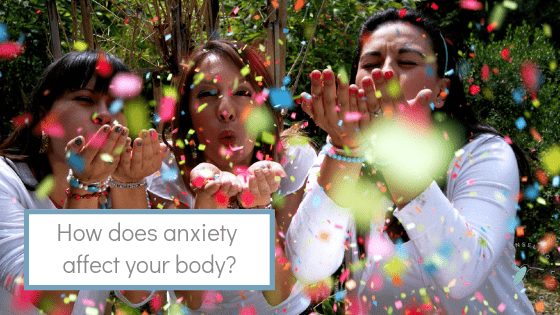Is anxiety a physical experience?
Anxiety activates our a branch of our nervous system, called the sympathetic branch. The sympathetic branch is better known as the fight or flight response. When we are faced with a threat, our bodies will either fight the threat, freeze, or flee the threat. Our bodies undergo a magnificent transformation to help us manage this threat. This system is great when we are faced with a threat and we need to survive, however it can also be get in the way of living our daily lives. This is what it’s like to have anxiety. Everyday tasks or events we perceive as threats- such as time deadlines, upcoming events, or public speaking- will trigger the fight or flight response that leads to a physiological reaction.
we are faced with a threat, our bodies will either fight the threat, freeze, or flee the threat. Our bodies undergo a magnificent transformation to help us manage this threat. This system is great when we are faced with a threat and we need to survive, however it can also be get in the way of living our daily lives. This is what it’s like to have anxiety. Everyday tasks or events we perceive as threats- such as time deadlines, upcoming events, or public speaking- will trigger the fight or flight response that leads to a physiological reaction.
What are some specific physical ways anxiety can manifest itself, even when a person isn’t feeling acute stress?
- Shoulder and neck tension– Over time, the muscle tension that we experience from stress builds up and can create neck cramps and stiff shoulder.
- Fatigue– The sympathetic system, or fight or flight system, is very active even if you aren’t consciously aware of the work your body is doing. Over time, the underlying anxiety can create exhaustion and fatigue. It can affect your motivation levels and your desire to get up and go.
- Poor sleep– For many people, their mind begins to think of their to do list when their head hits the pillow at night. This often isn’t recognized as anxiety becomes it is very common. However, these racing thoughts fire up the fight or flight system and interfere with restful deep sleep.
- Irritable bowel syndrome– During the activation of the fight or flight system, the bodies ability to digest food properly decreases. Blood flows to the arms and legs to prepare to fight. However, if we are constantly anxious our bodies do not properly digest and excrete our food intake. Irritable bowel syndrome (IBS) is extremely common for people with anxiety
 I didn’t know that was from anxiety!
I didn’t know that was from anxiety!
- Increased sweat– People with anxiety tend to perspire more. This sweat is typically located under the arms and on the back
- Tingly feet and hands– Originally the tingly feet and hands are meant to help us run away or attack a threat. However, when the fight or flight system is activated it can feel like our hands or feet are falling asleep and experience the pins and needles feeling.
- Gagging and burping– When we are stressed and experience anxiety, we swallow more air. This is meant to increase a fresh oxygen supply to our body if we are fighting a threat. However, today it usually just ends up coming out in the form of burps.
- Difficulty losing weight or maintaining a healthy weight– People with anxiety often aim to maintain a healthy weight and become discouraged after changing their nutrition and increasing their exercise routines. When we are stressed, our body pumps out cortisol. This is the stress hormone and when faced with a threat, cortisol increases the flow of glucose (as well as protein and fat) from your tissues and into the bloodstream to increase energy and physical readiness to handle the stressful situation or threat. The body stores unused stress energy around the abdominal organ. Accumulation of this fat, can increase your risk of cardiovascular disease, high blood pressure and diabetes.
Anxiety gets in the way of everyday living. Don’t let it take over! Our trusted therapists are trained to help you learn to gain control over your life again. Get started now.

